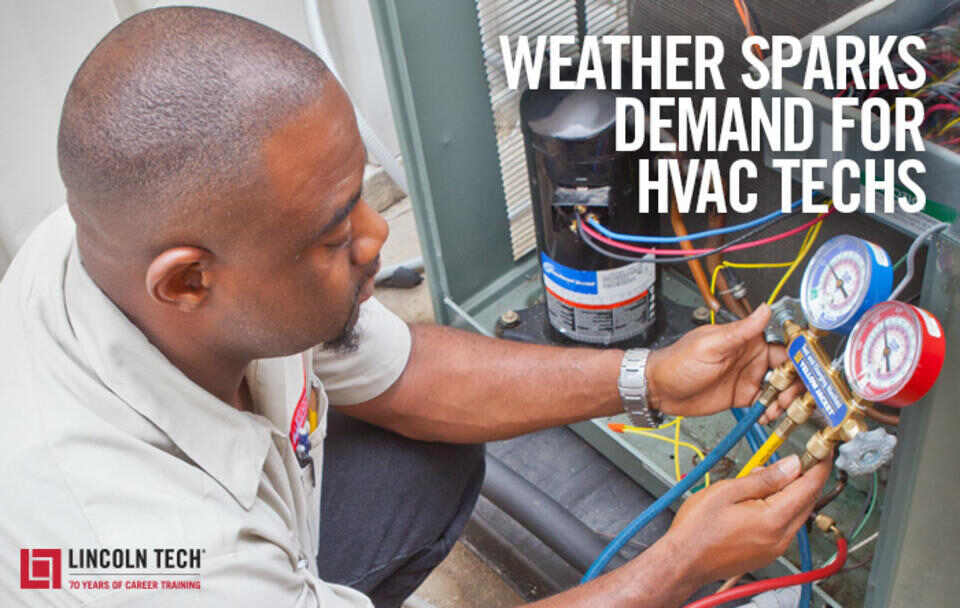Entry Level HVAC Jobs a Way Into Essential Worker Status


HVAC technicians are essential workers whose special skills are in demand throughout the year. The winter and summer months see high demand for heat and air conditioning services respectively, and the fall and spring are important maintenance seasons for the upkeep of systems needed in the season ahead. As the pandemic has shown us, extra demand has been generated by the need to keep vaccine development progressing smoothly, as well as protecting priceless vaccine shipments by transporting and storing them at the perfect temperatures. The need also extends beyond temperature control to air quality concerns. Germicidal ultraviolet light disinfection units are being installed in both residential and commercial environments, creating clean air circulation for residents and employees.
High Demand for Entry Level HVAC Technicians
There exists a major shortage of skilled workers in almost every skilled trade, and employers within the HVAC industry simply cannot fill their open positions fast enough. Total workforce demand for Heating, Ventilation and Air Condition technicians is expected to grow by over 34,000 technicians between 2019 and 2029.1 Skilled trades advocate Mike Rowe discussed the skills gap with PBS news hour recently, which helped shed light on just how much demand there is for a skilled trade like HVAC technician.
Training for an Entry Level HVAC Job
The key to obtaining the highest quality training is in understanding who a student will learn from. Learning from highly experienced master technicians will assist a student in learning the trade by drawing on a wealth of experience and technical knowledge. The HVAC Excellence Accreditation is the nationally recognized accreditor of HVAC educators.2 As of April 2021, there are only 126 Certified Master HVAC Educators in the United States, with many of them employed as master instructors at Lincoln Tech campuses.3 Additionally, three of Lincoln Tech’s HVAC programs have been granted six-year HVAC Excellence Accreditation.
The HVAC field requires a very specific set of skills. A report published by the HVACR Workforce Development Foundation (WDF) highlights refrigeration technician, electrical designer, network support specialist, HVAC mechanic and HVAC installer as several of the field’s hardest-to-fill occupations – and predicts that almost half of the current technicians and installers in the U.S. plan to retire by 2025.4 This will continue to exacerbate the skills gap in the years ahead, while providing incredible opportunity for a technician to learn and grow within the career field.
“HVAC programs in the U.S. and Canada are seeking new students, from recent high school graduates to veterans or second-career adults,” confirms HVACR WDF Executive Director Kari M. Arfstrom. “New employees can be assured of a job that cannot be off-shored, is high-tech and offers better-than-average pay.”
Lincoln Tech was founded in 1946, and has been providing HVAC technical training since the day it opened. Tens of thousands of successful HVAC technicians learned their skills at Lincoln Tech over those many years, and you too can build the skills needed for an excellent career in a profession that simply can’t be outsourced.
1 National Center for O*NET Development. 49-9021.00 - Heating, Air Conditioning, and Refrigeration Mechanics and Installers. O*NET OnLine. Retrieved April 12, 2021, from https://www.onetonline.org/link/summary/49-9021.00
2 Available on the Internet at https://www.escogroup.org/hvac/ Accessed on 4/12/2021.
3 List of Certified Master HVAC Educators available at https://www.escogroup.org/hvac/cmhe.aspx. Last Accessed on 4/12/2021.
4 Available in the labor analysis report from http://careersinhvacr.org/site/306/Labor-Analysis-Reports.
Original article published September 6, 2016. Article updated/rewritten with current trade references and latest career development information from Onetonline (Bureau of Labor Statistics).
